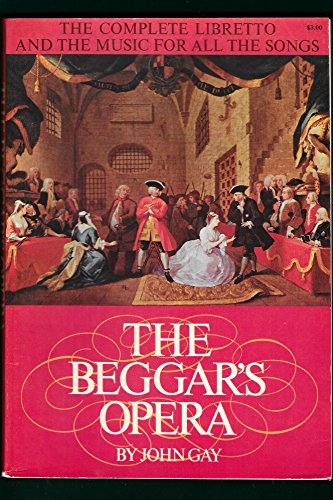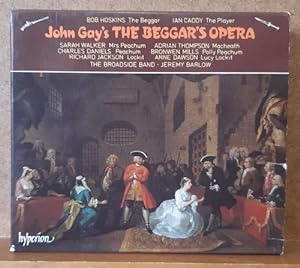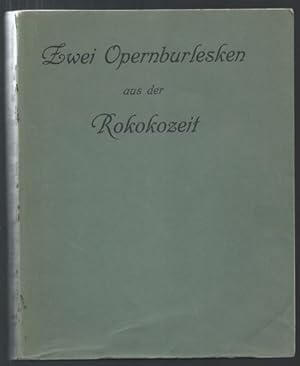the beggar's opera von pepusch (14 Ergebnisse)
FeedbackSuchfilter
Produktart
- Alle Product Types
- Bücher (12)
- Magazine & Zeitschriften (Keine weiteren Ergebnisse entsprechen dieser Verfeinerung)
- Comics (1)
- Noten (1)
- Kunst, Grafik & Poster (Keine weiteren Ergebnisse entsprechen dieser Verfeinerung)
- Fotografien (Keine weiteren Ergebnisse entsprechen dieser Verfeinerung)
- Karten (Keine weiteren Ergebnisse entsprechen dieser Verfeinerung)
- Manuskripte & Papierantiquitäten (Keine weiteren Ergebnisse entsprechen dieser Verfeinerung)
Zustand
Einband
Weitere Eigenschaften
- Erstausgabe (Keine weiteren Ergebnisse entsprechen dieser Verfeinerung)
- Signiert (Keine weiteren Ergebnisse entsprechen dieser Verfeinerung)
- Schutzumschlag (Keine weiteren Ergebnisse entsprechen dieser Verfeinerung)
- Angebotsfoto (5)
Sprache (3)
Gratisversand
Land des Verkäufers
Verkäuferbewertung
-
EUR 10,95
Währung umrechnenKostenlos für den Versand innerhalb von/der USAAnzahl: 1 verfügbar
In den WarenkorbZustand: Good. Good condition. A copy that has been read but remains intact. May contain markings such as bookplates, stamps, limited notes and highlighting, or a few light stains. Bundled media such as CDs, DVDs, floppy disks or access codes may not be included.
-
The Beggar's Opera As It Is Acted at the TheatreRoyal in LincolnsInnFields Classic Reprint
Anbieter: PBShop.store UK, Fairford, GLOS, Vereinigtes Königreich
EUR 26,64
Währung umrechnenEUR 4,86 für den Versand von Vereinigtes Königreich nach USAAnzahl: 15 verfügbar
In den WarenkorbHRD. Zustand: New. New Book. Shipped from UK. Established seller since 2000.
-
EUR 17,49
Währung umrechnenEUR 14,00 für den Versand von Vereinigtes Königreich nach USAAnzahl: Mehr als 20 verfügbar
In den WarenkorbZustand: New. In.
-
EUR 17,49
Währung umrechnenEUR 14,00 für den Versand von Vereinigtes Königreich nach USAAnzahl: Mehr als 20 verfügbar
In den WarenkorbZustand: New. In.
-
Gay's The Beggar's Opera, With new Settings of the Airs and Additional Music by Frederic Austin
Anbieter: Ria Christie Collections, Uxbridge, Vereinigtes Königreich
EUR 31,09
Währung umrechnenEUR 14,00 für den Versand von Vereinigtes Königreich nach USAAnzahl: Mehr als 20 verfügbar
In den WarenkorbZustand: New. In.
-
EUR 31,09
Währung umrechnenEUR 14,00 für den Versand von Vereinigtes Königreich nach USAAnzahl: Mehr als 20 verfügbar
In den WarenkorbZustand: New. In.
-
EUR 31,09
Währung umrechnenEUR 14,00 für den Versand von Vereinigtes Königreich nach USAAnzahl: Mehr als 20 verfügbar
In den WarenkorbZustand: New. In.
-
John Gay's The Beggar's Opera
Verlag: London, Hyperion Records, 1991
Anbieter: ANTIQUARIAT H. EPPLER, Karlsruhe, Deutschland
EUR 15,00
Währung umrechnenEUR 19,95 für den Versand von Deutschland nach USAAnzahl: 1 verfügbar
In den WarenkorbPlaytime 150min. 2 CD mit Booklet (Notes en francaise, mit dt. Kommentar). Pappschuber etwas bestoßen, sonst gut.
-
EUR 16,90
Währung umrechnenEUR 70,00 für den Versand von Deutschland nach USAAnzahl: 5 verfügbar
In den WarenkorbTaschenbuch. Zustand: Neu. The Beggar's Opera | A comic opera | Johann Ch. Pepusch | Taschenbuch | Paperback | 108 S. | Englisch | 2018 | hansebooks | EAN 9783337514471 | Verantwortliche Person für die EU: Hansebooks PoD, Trakehner Weg 52, 22844 Norderstedt, office[at]hansebooks[dot]com | Anbieter: preigu.
-
The Beggar's Opera. Words: Gay. Music: arr. Pepusch and (Frederic) Austin. Speaking Parts: Zena Walker, John Neville, Rachael Roberts, Erich Porter. Paul Rogers (u.a.). Singing Parts: Elsie Morison, John Cameron, Monica Sinclair, Ian Wallace, Owen Brannigan (u.a.). The Pro Arte Orchestra and Chorus. Conductor: Sir Malcolm Sargent. Producer: Denis Carey. 2 Schallplatten.
Verlag: His Masters Voice CLP 1052/1053 (englische Pressungen). Ohne Jahr (1955)., 1052
Anbieter: Antiquariat Les-art, Burgstetten, Deutschland
EUR 40,00
Währung umrechnenEUR 8,00 für den Versand von Deutschland nach USAAnzahl: 1 verfügbar
In den Warenkorb2 LPs 30 cm. illustrierte OCovers mit Stich (Szenenbild) von William Blake nach William Hogarth. Covers mit leichten Alters- und Gebrauchsspuren, bei Platte 2 F?lze des Covers beim Einschub 3 bzw. 7 cm aufgeplatzt, aber sauber geklebt. Platten sehr gut mit nur wenigen leichten und nur vereinzelt h?rbaren Oberfl?chenspuren und -kratzern. Seltene Erstpressung dieser Einspielung in der Anfang des 20. Jahrhunderts restaurierten Fassung von Frederic Austin. Dieser hatte die Oper mit zus?tzlich beigef gter eigener Musik wieder auff hrungsf?hig gemacht. Die Anregung zu dieser 1728 in London uraufgef hrten Parodie auf die italienische Oper kam von Jonathan Swift. Die gro?en M?nner der Zeit, u.a. Premierminister Walpole, werden hier als Stra?enr?uber, Diebe, Hehler und korrupte Staatsbeamte portraitiert. Laut einem zeitgen?ssischen Bonmot machte das erfolgreiche St ck den durch Spekulationen verarmten Gay "rich" und seinen Theatermanager John Rich "gay". Die deutsche ?bersetzung von Elisabeth Hauptmann diente 1929 Bertolt Brecht und Kurt Weill als Vorlage die freie Bearbeitung in ihrer Dreigroschenoper, wobei aber bereits 1770 eine deutsche Fassung in ?bersetzung von E.E. Buschmann als "Die Stra?enr?uber" in Bremen erschienen war. Eine neuere deutsche ?bersetzung schuf 1960 Hans Magnus Enzensberger. Sprache: en.
-
The Beggar's Opera [3 Vinyl-LP-Box-Set]. Zwischentexte und Sprecher: Hans Dierer Hüsch
Verlag: Schwann, 1979
Sprache: Deutsch
Anbieter: Druckwaren Antiquariat, Salzwedel, Deutschland
Verbandsmitglied: GIAQ
EUR 20,00
Währung umrechnenEUR 50,00 für den Versand von Deutschland nach USAAnzahl: 1 verfügbar
In den Warenkorb3 Vinyl-LPs + Beiheft. Zustand: Sehr gut. LPs sehr gut erh. Box insgesamt etw. muffig. Sprache: Deutsch Gewicht in Gramm: 1550.
-
The Beggar's Opera, as it is Perform'd at both Theatres, with the Additional Alterations by Dr. Arne, for the Voice, Harpsichord and Violin, the Basses entirely New [Klavierauszug, ohne weitere Stimmen].
Verlag: London, Printed for T. Straight & Skillern [ca. ]., 1769
Anbieter: Musikantiquariat Bernd Katzbichler, Haarbach, D, Deutschland
EUR 550,00
Währung umrechnenEUR 9,50 für den Versand von Deutschland nach USAAnzahl: 1 verfügbar
In den Warenkorbqu-fol. 29 gest. S. Nur mit Faden geheftet, gelockert, einige Seiten lose. Titelblatt etwas gebräunt und gering fleckig, mit altem Besitzvermerk. RISM P 1207a + A 1740; BUC S. 96. - Seltene frühes Arrangement (von Thomas Augustin Arne) der Lieder aus der berühmten satirischen Oper - der meistaufgeführten in englischer Sprache. - Sauberer, kräftiger Abzug.
-
Zwei Opernburlesken aus der Rokokozeit: Telemaque. Parodie von Le Sage (Paris 1715). The Beggar's Opera von Gay und Pepusch (London 1728). Partitur.
Verlag: Commissionsverlag von Leo Liepmannssohn, Antiquariat, Berlin, 1912
Anbieter: Antiquariat Bücherstapel, Leipzig, Deutschland
Verbandsmitglied: BOEV
Noten
EUR 120,00
Währung umrechnenEUR 29,00 für den Versand von Deutschland nach USAAnzahl: 1 verfügbar
In den WarenkorbZustand: Gut. Jahr: 1912. Einband: Broschur. Beschreibung: Mit 7 Abb. Zum erstenmal mit der Musik neu herausgegeben, übersetzt und eingeleitet von Georgy Calmus. Mit Frontispiz. VN/Pl. no. G.C. 1. Textunterlegung: Telemaque (Frz.), The Beggar's Opera (Engl./Dt.). Umschlag am Rücken gering fleckig. Innen sehr gut erhalten. Sprache: de. XL, 223 S.
-
The Beggar's Opera with Musical Score By Johann Christian Pepusch [bound with] The Second Part of the Beggars Opera (Polly)
Verlag: John Watts & T. Read, London, 1749
Anbieter: Blind-Horse-Books (ABAA-FABA-IOBA), DeLand, FL, USA
EUR 429,72
Währung umrechnenEUR 5,27 für den Versand innerhalb von/der USAAnzahl: 1 verfügbar
In den WarenkorbZustand: Very Good. Modern full calf leather with a floral blind-stamped borders the spine with compartments with harp designs and a red leather title, renewed endpages. Contains illustrated title page and numerous musical scores for each song as well as the overture. The bindings are tight and square. Text clean, light even toning. Moderate shelf handling wear. 8vo; 8 inches tall; delicate edges to the first few pages, some age-related blemishes through-out. The Beggar's Opera with the ouverture in score; and the musick prefix'd to each song. 76 pages followed by 8 pages of other books published by John Watts with brief synopsis of each. The first edition had the score on 16 pages at the end, here the music is printed in the text in woodcut. Second Part of the Beggars Opera. v, [ 1 ], 70. This a pirated edition of Polly, Gay's sequel to the Beggar's Opera. Published Anonymous. By John Gay. Also known as Polly and is a ballad opera with text by John Gay and music by Johann Christoph Pepusch. It is a sequel to Gay's The Beggar's Opera. Due to censorship, the opera was not performed in Gay's lifetime. It had its world premiere on 19 June 1777 at the Haymarket Theatre in London. Provenance: From the private collection of Anton Vishio, Sr. a scholar and mentor. He taught Latin and Classical Greek at the Gilmore School in Baltimore for 45 years. Ref: ESTC ESTC,; T13803; Old English plays noted bibliographically and biographically. London: Pickering & Chatto, [1909],; page 63, item no. 536. Background Information: The Beggar's Opera, written in 1728 by John Gay with music arranged by Johann Christoph Pepusch, is a notable ballad opera in three acts. This play holds great significance in the realm of Augustan drama and stands as the sole enduring example of the once flourishing genre of satirical ballad opera. The primary aim of this piece was to satirize the burgeoning popularity of Italian opera in London. As aptly described by The New York Times, Gay crafted the work as an anti-opera, cleverly exploiting the public's fascination with the Italian opera style prevalent in 18th-century London. By lampooning this style, The Beggar's Opera captivated audiences with its wit and irreverence. In contrast to the grandeur and lofty themes of traditional opera, Gay's work relied on familiar tunes and portrayed characters from everyday life. While some of the songs were composed by notable opera composers such as Handel, only the most popular melodies were included. This deliberate choice allowed the audience to hum along, forging a connection with the music and characters on stage. Central to its narrative, The Beggar's Opera satirically tackled political corruption, poverty, and social injustice, permeating all levels of society. Through its biting commentary, the play shed light on the pervasive nature of corruption, exposing its presence in various strata of society. Overall, The Beggar's Opera not only served as a parody of Italian opera but also offered a critical examination of societal issues. By blending accessible music, relatable characters, and astute satire, this enduring piece continues to captivate audiences and maintain its relevance to this day. The Second Part of the Beggars Opera (Polly) Similar to its predecessor, Polly also faced censorship during its time. The production was prohibited by the Lord Chamberlain, the Duke of Grafton, most likely influenced by Walpole. However, rather than negatively impacting Gay, the censorship served as exceptional advertisement for the play. In 1729, Polly was published through a subscription model, leading Gay to earn a substantial sum of money. Although Polly did not see the light of day on stage during Gay's lifetime, its censorship was more severe compared to the first play. Walpole deemed the satire in Polly to be far more explicit and potent. Consequently, the Lord Chamberlain banned the play from even entering the rehearsal stage, labeling it as a lewd and defamatory work. It is worth noting that the ban on Polly may have been a result of its association with Gay rather than solely its subject matter. Finally, on 19 June 1777, Polly made its stage debut at the Haymarket Theatre in London. However, the ban's impact was merely nominal, as the play was not only printed and sold in April 1729 but also prompted Gay and his publisher to file injunctions against 17 printers and booksellers for pirating the work in June of the same year.












![Bild des Verkäufers für The Beggar's Opera [3 Vinyl-LP-Box-Set]. Zwischentexte und Sprecher: Hans Dierer Hüsch zum Verkauf von Druckwaren Antiquariat](https://pictures.abebooks.com/inventory/md/md30193776551.jpg)

![Bild des Verkäufers für The Beggar's Opera with Musical Score By Johann Christian Pepusch [bound with] The Second Part of the Beggars Opera (Polly) zum Verkauf von Blind-Horse-Books (ABAA-FABA-IOBA)](https://pictures.abebooks.com/inventory/md/md31544934385.jpg)